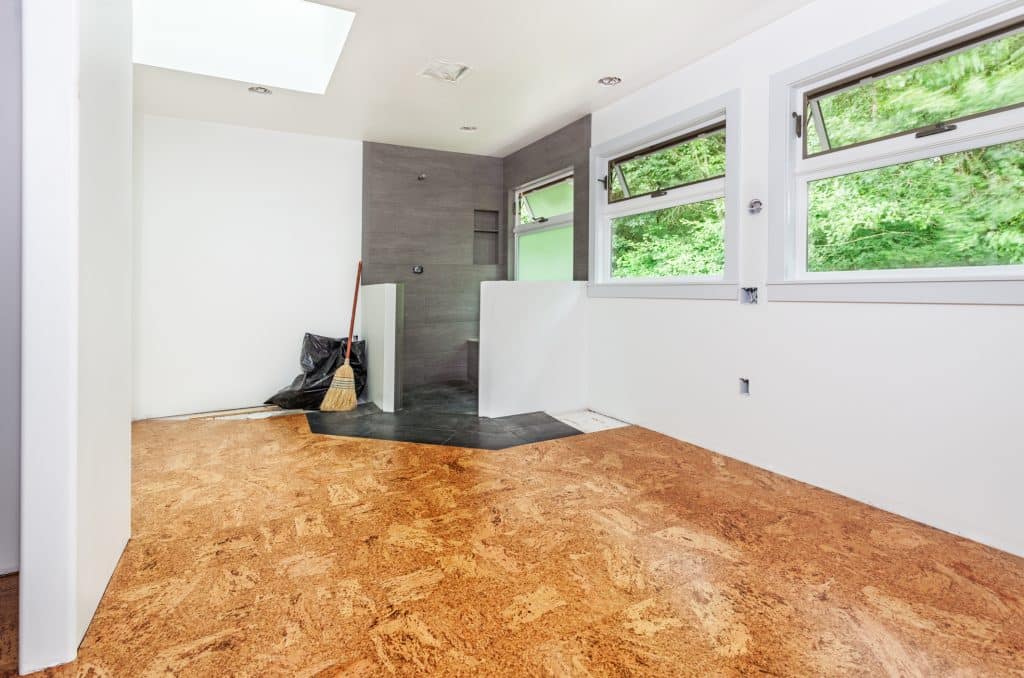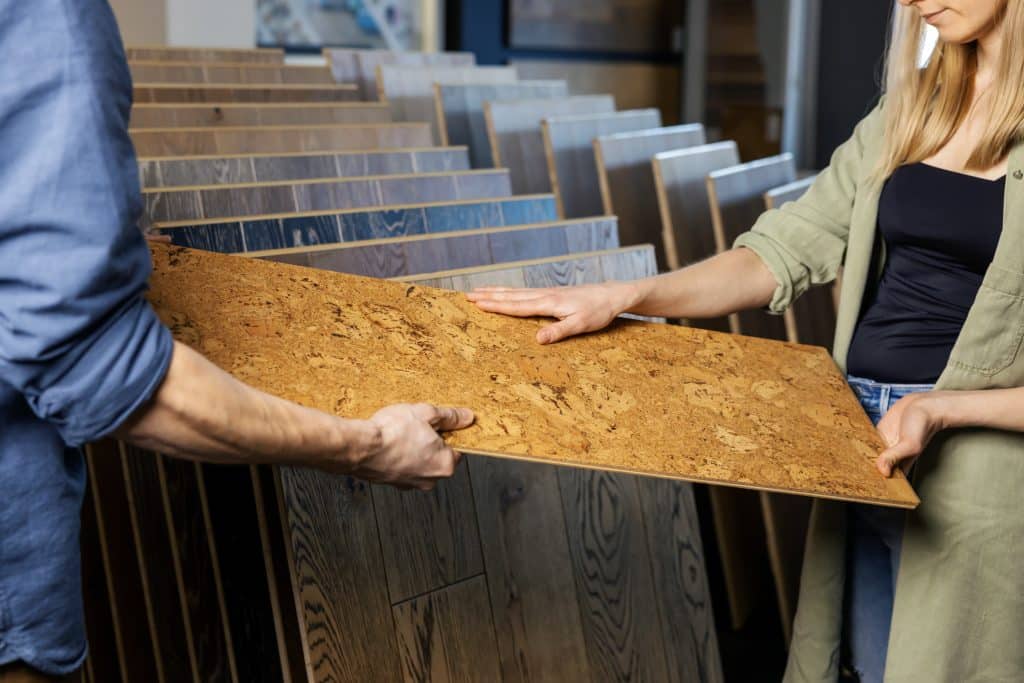
Sustainable, Comfortable & Natural
Cork Flooring
Cork flooring is one of the most beautiful, sustainable, and comfortable flooring options available. Its natural properties include resistance to mold/bacteria, fire resistance, anti-allergenic, and insect resistance. A rapidly renewable resource, cork is available in floating planks or glue-down tiles. It is great for a residential or office space because it has superior acoustic and thermal properties.

Cork Flooring
How To Buy?
If you live in Portland, Oregon please stop by our Eco Floors showroom to view our hand-selected options for cork. Our knowledgable staff can answer any questions you have to inform your purchasing decision. We also offer industry-leading installation. Eco Floors is owned by a Father & Son who were former installers. We understand the importance of an excellent installation to the overall appearance and longevity of your floor.
Why Should You Buy Cork Flooring?
Cork Flooring Facts
To decide whether cork is right for you, we’ve put together a Six-point guide to help you get to know its properties.
Application – First let’s discuss areas we DO NOT recommend putting cork flooring: Anywhere outdoors, full restrooms, basements that seasonally take on moisture, nonclimate controlled spaces, spaces prone to large heat fluctuations (10+ degrees is our definition), and medium-high foot traffic areas. Now for the areas where we think fit best, and where we’ve seen it have great longevity: Studios & Condos, small offices (beware of high heels), homes with grown adults, and individual rooms within a home that receive less foot traffic. The biggest dangers to cork flooring are moisture, temperature fluctuations, and objects with a high weight per square inch. We encourage buyers to envision the specific application of the room or area in which they desire to put a cork. If any of the big dangers mentioned are present, we think it hurts your chances of having a long-lasting floor.
In Portland, Oregon, we mainly see cork used in studio apartments, condos, and bedrooms. We find the main reasons customers are drawn to purchasing cork is because of its unique appearance, eco-friendly properties, and great underfoot feel. By adding cork flooring to the former areas, customers can enjoy a comfortable floor and improve the indoor air quality. It also adds acoustic and insulate value to help meet the needed specifications in apartment and office settings. Cork wall coverings can add a great aesthetic accent to any space. They can also block sound transfer. Think of how useful this would be for a home or professional music studio, a meeting room, or any space where you desire to prevent sound transfer.
Additionally, there are two main types of installation: floating and glue down. Without discussing the specific pros and cons of each type, just know that gives you flexibility when deciding where to install cork, and can help reduce end costs.
Cost – Cork flooring ranges from $6-15/square foot + shipping costs ranging from $150-$1000. Installation ranges from $3-8/square foot depending on your location in the United States, and the product you select. Factors that increase cost include glue-down installation, custom colors/patterns, needing to be site finished, and/or special top coat finishes. Our most affordable products are Wicanders, Amorim, Opus, and WE cork. These are excellent products that boast waterproofing (Amorim), a high resistance technology (HRT) finish, a lifetime residential warranty, and a floating installation. If you want to customize color and finish options, we recommend APC and Duro Designs Cork.
Durability – Because cork is a naturally softer material, it is inherently less durable than hardwood flooring, laminate flooring, vinyl plank flooring, or tile, in that order. It is comparable to Marmoleum flooring. Let’s use hardwood flooring as a standard of comparison. If you consider hardwood floors durable and you are used to maintaining them, then you should find cork to be a disable option. Like hardwood floors, you should clean up spills and standing moisture as quickly as possible. Large animals, lots of foot traffic, and sliding furniture will produce scratches. However, many scratches will blend into the cork floorings’ natural texture. Gouges will not blend in and will detract from its appearance. You will want to disperse the weight of heavy items, especially if they are concentrated into small footprints i.e. refrigerator wheels, and skinny furniture legs. Cork flooring is probably not a great option for families with kids, several pets, or indoor shoe wearers.
Appearance – As with any natural product, expect variation in the appearance of cork flooring. However, with modern technology, companies have been able to print patterns into the cork surface. For instance, Amorim offers Woodwise, a cork-backed plank, with a vinyl top layer for enhanced durability and the appearance of wood. Other products feature mosaic tile, wood, stone, and other appearances. Cork flooring comes in many sizes: 4′-5′ planks, 1′ square tiles, 3’x1′ panels, and customizable sizes. If you select a customizable product such as Euro Designs cork OR APC Cork, you can select different types of finishes. Many cork floors come with a matte finish, but you can find options with more shine to suit your tastes. If bold colors are your thing, you can find cork floors in almost any color!
Availability – IF you’re ready to purchase cork flooring or wall covering, expect to receive it in 2-3 weeks for stock products. Many of our Cork Products are coming from Portugal or Canada, and thus require higher shipping times. Custom Products can take anywhere from 2-3 months to be made and delivered. At Eco Floors, we work closely with our suppliers to monitor these wait times and expedite them if possible. We do not stock these products at our Portland, Oregon location at this time. We order them directly from the manufacturers and can have them shipped to most locations in the United States.
Eco-Friendly Properties – One of the biggest reasons people fall in love with cork is because it’s a sustainable product. It is made from the bark of the cork oak tree. Interestingly, when the bark is harvested, the tree is not damaged. It is left to naturally regrow its outer bark, which takes about 9 years. Cork stripping is a technical, high-paid industry. Thus, a lot of skilled effort goes into the preservation of the cork forests. Since these trees can live up to 200 years and are essential to supporting a diverse ecosystem, there are strict laws to protect the Mediterranean forests.
Like other trees, cork oak trees convert CO2 Into oxygen. However, harvested cork trees absorb 3-5 times as much CO2 as unharvested trees. They store additional carbon each time the bark is harvested. Additionally, high-quality cork flooring is 100% Recyclable. The above factors make cork flooring and wall coverings an excellent option to qualify for LEED Credits. LEED is the most widely used green building system that is helping move global buildings towards sustainability.
ECO Floors - Cork Flooring
Frequently Asked Questions
Cork Flooring is a naturally softer material meaning it is inherently less durable than hardwood flooring, laminate flooring, vinyl plank flooring, or tile, in that order. It will scratch and dent easier than these materials. Also, the locking system in floating cork is often made of high-density fiberboard (HDF) which is moisture resistant but can cause seam swelling if exposed to too much moisture.
A good idea for the extra sensitive customers is to line up a house cleaner after the hardwood refinish takes place. During the refinish, request plastic be put up to block off surrounding rooms. This will come at an additional cost, but make protects especially sensitive items such as an office or electronics.
The simple answer is it depends on where you intend to install it (see the top of this page under "application"). If installed in the right area, it is hard to beat cork flooring's soft underfoot feel, beautiful appearance, mid-level price point, ease of installation, and sustainable characteristics.
While dent resistance is below many other types of flooring (Hardwood, laminate, vinyl, tile) cork has many excellent properties for a kitchen. It is naturally Fire resistant, which creates a safe environment for potential high-temperature spills and accidents. What makes this possible? A substance contained within a cork called Suberin. Suberin also repels bugs, molds, termites, and funguses causing cork to be hypoallergenic and anti-microbial. In an area where you, your family, or lots of people spend time, cork is an excellent flooring option to assist in keeping the area clean and safe. Just be diligent about cleaning up spills and frequently dropping things.






